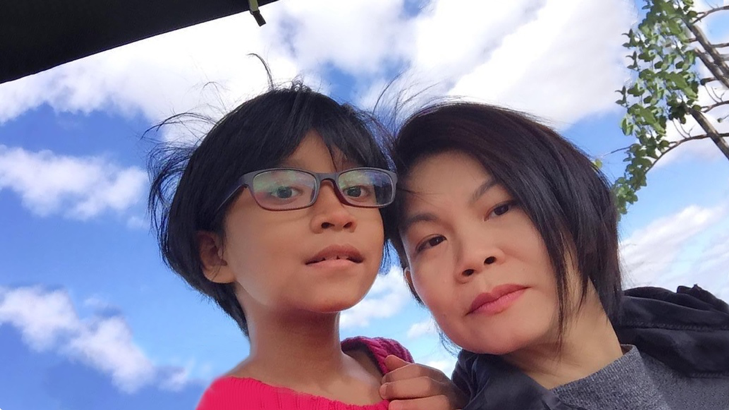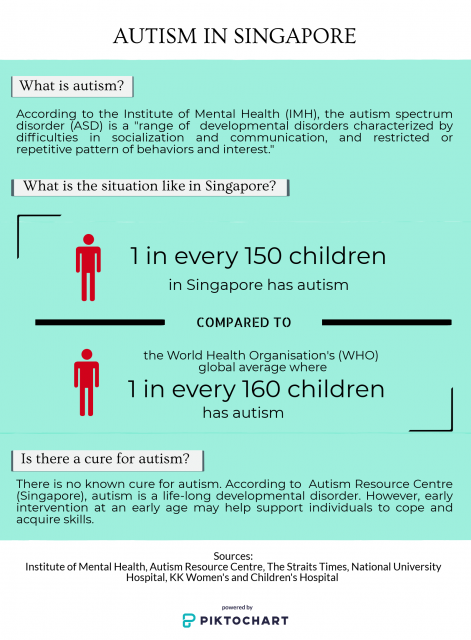Repurposed by Kelvin Goh
When Mrs Samantha Chua found her 14-month-old daughter Izzy flapping her hands uncontrollably, she had her checked by a specialist.
The specialist said Izzy showed signs of autism. He did not give an official diagnosis as the girl was barely 2, but recommended early intervention for Izzy anyway.
Mrs Chua left the specialist’s room feeling heavy-hearted. “I developed amnesia and would look up the Internet every night to see what happened to people on the spectrum. I was lost, I did not know what to do. I started having depression,” she recalled.

But after a few months, Mrs Chua and her husband told themselves: “Hey, forget about the diagnosis. Let’s focus on Izzy’s areas of weaknesses and help her.”
One in every 150 children in Singapore has autism, according to data from the National University Hospital (NUH) and KK Women’s and Children’s Hospital (KKH).

Before becoming a mother, Mrs Chua was a human resource (HR) manager at an investment holding company. Later, she and her husband started a book-trading business, which was growing when they were expecting Izzy.
After Izzy was born, Mrs Chua became a full-time housewife. When she learnt that her daughter’s likely on the autism spectrum, she and her husband decided to put her on the Son-Rise Program, which focuses on developing her social skills.
Mr Jack Mason-Goodall, a child facilitator from the Autism Treatment Center of America which founded the program, said: “We believe that unconditional love and acceptance are the fundamentals of helping a child grow and heal.”
It was not an easy start for Mrs Chua as the stress level that came with providing 24/7 care for an autistic child was very high. As a result, she had Temporomandibular Joint Syndrome (TMJ) from clenching her jaw too much.
That was when Mrs Chua realized she had to take care of herself first. “I asked myself, what is one thing I always wanted to do, but never had the chance to?”
It was learning to play the ukulele. So she signed up for a course and when she completed it, she felt “accomplished”. “I’m able to take care of myself by doing things I always wanted to do,” she said, adding that this sense of empowerment also made her a better caretaker for Izzy.
Her efforts have paid off as Izzy is now much more driven to learn new things and communicate with others. The girl used to have problems interacting with other children, but the 12-year-old now enjoys making friends with her peers in her taekwondo class. She’s also overcome her struggle with balance and enjoys rollerblading now.
Mr and Mrs Chua said they’ve also learnt to be accepting of Izzy’s repetitive behaviors and routines. When Izzy keeps flapping her hands or standing on toes, they used to try to stop her. Now, they see these as beautiful moments and would even join her routine to show their unconditional love.
Mrs Chua added: “That was the most fundamental difference, because it translates into how we communicate with her [regarding] the things we value about her.
“We also praise her whenever we can, [even for something] as simple as making eye contact.”
“[Such unconditional acceptance] was tough, but it’s because I used to think of it as a sacrifice. Now, I find it a blessing to spend every day with Izzy, and life feels so purposeful.”
But Mrs Chua also stressed that she wouldn’t have been able to love her daughter unconditionally if she hasn’t loved herself unconditionally.
“You can’t pour from an empty cup.”
“I have to love myself first. If I am critical of myself, the tendency is that I will be critical of someone else.”
“That’s the most important lesson I want to teach Izzy, for her to love herself unconditionally.”
Have you ever cared for a person with autism? Share with us in the comments section below about your experience.
